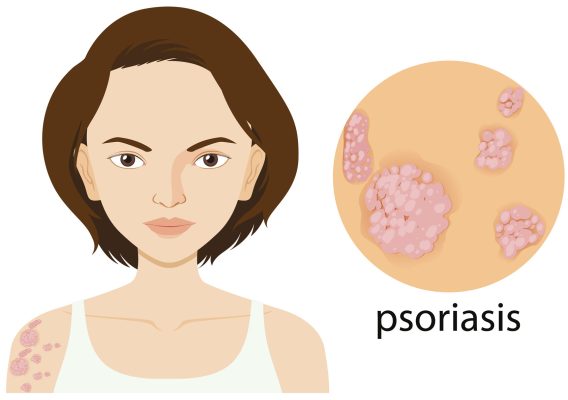Ayurveda
Understanding Psoriasis: Causes, Symptoms, and Effective Ayurvedic Treatments 2023
Psoriasis: Causes and Symptoms
Psoriasis is a multifaceted condition that affects countless individuals over time. It can be a challenging journey, with lifestyle factors, diet, and mental stress contributing to its complexity. Despite its intricate nature, there is hope in the form of Ayurvedic treatments. In this extensive guide, we will delve deep into the causes and symptoms of psoriasis while shedding light on how Ayurveda can effectively cure this condition.
Section 1: Uncovering the Root Causes of Psoriasis
Psoriasis is not a simple ailment; it arises from a multitude of factors. Let’s explore these underlying causes in more detail:
- Dosha Imbalance: According to Ayurvedic principles, psoriasis is often linked to an imbalance in Vata and Pitta Dosha. This imbalance leads to a condition known as Kitibh.
- Phlegm and Bile Aggravation: Psoriasis can manifest due to the exacerbation of phlegm and bile in the body, giving rise to a condition resembling leprosy.
- Lifestyle Choices: Your daily lifestyle plays a significant role in psoriasis. Excessive consumption of gas-producing foods, stale meals, curd, peas, and gram can act as triggers.
- Addictions: Habits like alcohol and tobacco use can exacerbate psoriasis symptoms.
- Weakened Immunity: A compromised immune system, often induced by stress, anxiety, anger, and sleep disturbances, can increase susceptibility to psoriasis.
- Autoimmune Component: Psoriasis is also categorized as an autoimmune disorder, where the immune system mistakenly targets healthy skin cells.
- Genetic Predisposition: There’s a genetic connection to psoriasis, meaning it can be inherited if parents have the condition.
- Unexplained Factors: Interestingly, modern science has yet to fully comprehend some of the causes behind psoriasis.
Section 2: Recognizing Psoriasis Symptoms
Identifying psoriasis is crucial for timely intervention. The following are common symptoms to be vigilant about:
- Skin Swelling
- Red-White Patches
- Intermittent Itching and Burning Sensation
- Skin Dryness Accompanied by White Scales
- Cracking and Painful Skin Patches
- Thickened Nails with Spots
- Joint Pain and Swelling
- Scalp Issues Resembling Dandruff
- Severe Cases: In some instances, psoriasis can worsen to the extent that it leads to muscle weakness, extreme coldness, and even fever.
Section 3: Impact of Psoriasis on Different Body Areas
Psoriasis can manifest in various regions of the body, each presenting unique challenges:
- Generalized Psoriasis: It can appear anywhere on the body.
- Extremities: Initially, psoriasis commonly appears on the elbows, knees, and fingers.
- Trunk: It’s more prevalent on the back, abdomen, and chest.
- Early Stages: When the disease is in its initial stages, small red-white spots may appear, gradually spreading.
- Scalp Psoriasis: Some individuals only experience scalp psoriasis, which can worsen if mistaken for dandruff.
- Prolonged Psoriasis: If psoriasis persists over an extended period, it can weaken bones and lead to a condition called psoriatic arthritis.
Section 4: Dispelling Common Psoriasis Myths
Let’s clear up some misconceptions surrounding psoriasis:
- Non-Contagious: Psoriasis is not contagious and cannot be transmitted by touching a psoriasis patient.
Section 5: Effective Ayurvedic Treatments for Psoriasis
Ayurveda offers holistic solutions for effectively managing and curing psoriasis:
- Medicinal Treatment: Start psoriasis treatment under the guidance of an Ayurvedic practitioner who can recommend the right medication and dosage.
- External Applications: Follow your doctor’s advice and apply medicated oils, creams, or lotions to your skin.
- Lifestyle Adjustments: Adopt a balanced diet without excessive spices, meat, or salty, spicy, sour, and acidic foods.
- Dietary Changes: Eliminate pickles, brinjals, potatoes, peas, gram, and processed foods, and favor Satvik (pure) foods.
- Cautions: Pay attention to contraindications and consult an Ayurvedic doctor when necessary.
- Nutritional Choices: Opt for healthier options by avoiding junk food, packaged foods, and preservatives.
- Quality Sleep: Ensure you get adequate sleep to strengthen your immune system.
- Breaking Addictions: Distance yourself from alcohol, smoking, and tobacco to minimize potential triggers.
- Emotional Balance: Work on managing mental stressors such as stress, anxiety, and anger.
- Yoga and Pranayama: Incorporate regular yoga, pranayama, and Surya Namaskar into your routine.
- Holistic Approach: Recognize that psoriasis treatment entails addressing multiple aspects, including Dosha imbalances and mental well-being.
- Patience and Persistence: Treating psoriasis takes time, and it’s crucial to maintain focus on both dietary and lifestyle improvements.
- Seek Professional Guidance: Accurate diagnosis by a qualified Ayurvedic doctor is essential for a successful treatment plan.
Some More Natural Remedies for Psoriasis “Healing from Within“
-
Dietary Modifications:
A fundamental step in managing psoriasis naturally is to pay close attention to your diet. Several dietary changes can make a significant difference:
- Anti-Inflammatory Foods: Incorporate foods rich in anti-inflammatory properties such as turmeric, ginger, and leafy greens. These foods can help reduce inflammation associated with psoriasis.
- Omega-3 Fatty Acids: Omega-3s found in flaxseeds can alleviate skin inflammation and improve the overall health of your skin.
- Gluten and Dairy Reduction: Some individuals with psoriasis may benefit from reducing or eliminating gluten and dairy products from their diet, as they can exacerbate inflammation.
- Hydration: Stay well-hydrated by drinking plenty of water to keep your skin moisturized from within.
-
Stress Management:
Stress is a known trigger for psoriasis flare-ups. Engage in stress-reduction techniques such as meditation, deep breathing exercises, yoga, and mindfulness practices. These can help calm your mind and reduce the chances of psoriasis exacerbation.
-
Topical Natural Remedies:
Certain natural ingredients can be applied topically to soothe psoriasis-affected areas:
- Aloe Vera: The gel from the aloe vera plant has anti-inflammatory and moisturizing properties, making it a soothing option for psoriasis-prone skin.
- Coconut Oil: Applying organic, virgin coconut oil can help alleviate dryness and itching associated with psoriasis. It also has antibacterial properties that can protect the skin.
- Apple Cider Vinegar: Diluted apple cider vinegar can be used as a natural skin toner to relieve itching and reduce redness.
-
Sun Exposure:
Moderate sunlight exposure can be beneficial for psoriasis. UVB rays from the sun can slow down skin cell turnover, reducing the formation of scaly patches. However, be cautious about overexposure, as sunburn can worsen symptoms. Consult your dermatologist for guidance on safe sun exposure.
-
Herbal Supplements:
Several herbs and supplements may offer relief from psoriasis symptoms:
- Oregon Grape: This herb contains berberine, which has shown promise in reducing inflammation and slowing down skin cell growth.
- Milk Thistle: Known for its liver-cleansing properties, milk thistle can help detoxify the body, potentially reducing psoriasis symptoms.
- Turmeric: Curcumin, the active compound in turmeric, has potent anti-inflammatory effects and may alleviate psoriasis symptoms when taken as a supplement.
-
Maintain a Healthy Lifestyle:
- Exercise: Regular physical activity can help boost your immune system, reduce inflammation, and improve overall well-being. Aim for at least 30 minutes of exercise most days of the week.
- Avoid Alcohol and Smoking: Both alcohol and smoking can exacerbate psoriasis symptoms. Quitting or reducing these habits can lead to noticeable improvements.
-
Patience and Consistency:
Managing psoriasis naturally requires patience and consistency. Results may not be immediate, but with time, you can experience a reduction in flare-ups and a noticeable improvement in your skin’s health.
Conclusion:
Psoriasis, though complex, can be effectively managed and treated through Ayurvedic approaches. By understanding its causes, recognizing its symptoms, and embracing Ayurvedic remedies, you can embark on a journey towards healing and relief. Remember, the path to overcoming psoriasis requires patience, determination, and the wisdom of Ayurveda.


